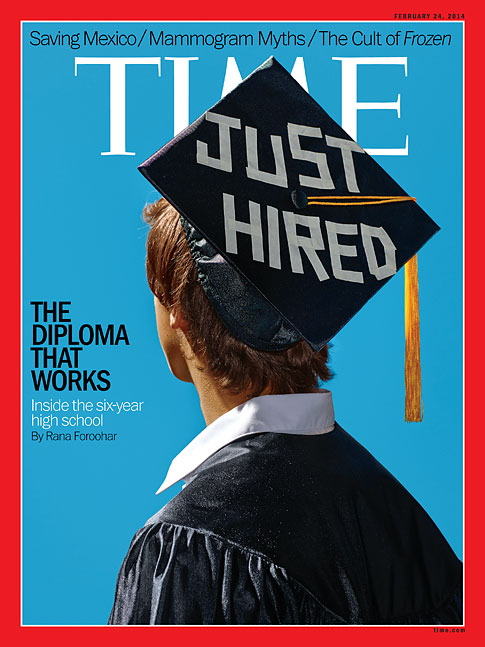
(6 of 7)
Vilma Smith, a 10th-grade math star at Sarah E. Goode, who claims she started off at the school as a shy and quiet outsider, wants to go on not to IBM but to UCLA to be a screenwriter, inspired by both software-design classes and literature courses. "I want to learn how to tell stories to other people, but I also want to understand how to tell my own story better," she says. Those are dream words for educators who want kids to have multiple pathways and a multidisciplinary approach to learning and to life. They also reflect the sort of person that your typical American blue-chip company would be dying to hire. "After one year, Vilma has become a leader, someone who can reflect, articulate and self-assess," says Charlotte Johnson, a former teacher and now the IBM program manager at Sarah E. Goode. "Believe me, not everyone in a company can do that."
The curriculum also emphasizes the soft skills of presentation, self-marketing and communication that better-off kids--raised in homes with college graduates whose behavior they can model--take for granted. On a recent winter's day at Sarah E. Goode, a group of students participated in a virtual-enterprise class, in which they devised mock companies that manufacture and sell imaginary products within a network of other high schools around the world.
Gabriel Rosa, the 16-year-old CEO of Titan Enterprises, an enterprise-software-design firm, is getting the latest beta-test results from his nervous CTO ("When do you expect that new app to be ready?" "Umm ... is Thursday O.K.?"), and trying to get a rather bored-looking marketing staff motivated about a rebranding exercise. "We need to excite our customers," he says, tentatively. The teacher urges him on, telling him to think about what Titan is really designing and who it's for. He course-corrects, making better eye contact, leaning in and asking more-specific questions: What types of retailers should the firm focus on? Which new apps are most promising? The team perks up. Rosa's confidence noticeably increases.
"I definitely want to start my own company someday. That's why I chose this school," says Rosa.
NEXT STEPS
It's early days for the six-year high school model, both in Chicago and in the other places it is rolling out, like upstate New York (where Democratic governor Andrew Cuomo has committed to building 10 P-Tech schools) and Connecticut (where Governor Daniel Malloy wants to launch P-Tech).
So far, the P-Tech model has received surprisingly little pushback from unions, even the aggressive Chicago teachers' union, because it operates within the traditional public school system rather than outside it, like charter schools. "It's captured the imagination of people who want to walk away from the whole debate over charters and testing and vouchers and data and just focus on where children need to be and how we can give them the steps on the ladder to get there," says Randi Weingarten, president of the American Federation of Teachers and a former president of the United Federation of Teachers.
